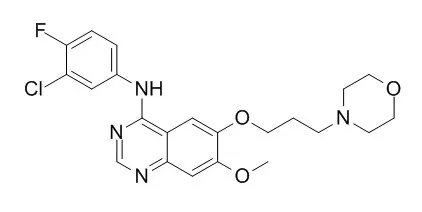| Description: |
Gefitinib (ZD-1839) is an EGFR inhibitor for Tyr1173, Tyr992, Tyr1173 and Tyr992 in the NR6wtEGFR and NR6W cells with IC50 of 37 nM, 37nM, 26 nM and 57 nM, respectively; it can reduce both cell proliferation and tumor growth of breast cancer cells expressing EGFR and/or HER2. Chronic Gefitinib treatment promotes ROS and mitochondrial dysfunction in lung cancer cells. Antioxidants may alleviate ROS-mediated resistance. |
| Targets: |
EGFR | HER2 | ERK | MAPK | ROS | Caspase |
| In vitro: |
| J Steroid Biochem Mol Biol. 2015 Apr;148:122-31. | | Calcitriol and its analogues enhance the antiproliferative activity of gefitinib in breast cancer cells.[Pubmed: 25510900] | Coexpression of EGFR and HER2 has been associated with poor disease outcome, high rates of metastasis and resistance to conventional treatments in breast cancer. Gefitinib, a tyrosine kinase inhibitor, reduces both cell proliferation and tumor growth of breast cancer cells expressing EGFR and/or HER2. On the other hand, calcitriol and some of its synthetic analogs are important antineoplastic agents in different breast cancer subtypes.
METHODS AND RESULTS:
Herein, we evaluated the effects of the combined treatment of Gefitinib with calcitriol or its analogs on cell proliferation in breast cancer cells. The presence of EGFR, HER2 and vitamin D receptor were evaluated by Western blot in two established breast cancer cell lines: SUM-229PE, SKBR3 and a primary breast cancer-derived cell line. The antiproliferative effects of Gefitinib alone or in combination with calcitriol and its analogs, calcipotriol and EB1089, were assessed by growth assay using a DNA content-based method. Inhibitory concentrations on cell proliferation were calculated by non-linear regression analysis using sigmoidal fitting of dose-response curves. Pharmacological effects of the drug combinations were calculated by the Chou-Talalay method. Phosphorylation of ERK1/2 MAPK was evaluated by Western blot. Gene expression of EGFR, HER2 and BIM was assessed by real time PCR. BIM protein levels were analyzed in cells by flow cytometry. The effects of the drugs alone or combinated on cell cycle phases were determined using propidium iodide. Apoptosis was evaluated by detection of subG1 peak and determination of active caspase 3 by flow cytometry. Gefitinib, calcitriol, calcipotriol and EB1089 inhibited cell proliferation in a dose dependent manner. The combinations of Gefitinib with calcitriol or its analogs were more effective to inhibit cell growth than each compound alone in all breast cancer cells studied. The gene expression of EGFR and HER2 was downregulated and not affected, respectively, by the combined treatment. Furthermore, phosphorylation of ERK 1/2 was inhibited a greater extent in co-treated cells than in the cells treated with alone compounds. The combination of Gefitinib with calcitriol or their synthetic analogs induced apoptosis in SUM-229PE cells, this was shown by the significant upregulation of BIM protein levels, higher percentages of cells in subG1 peak and increase of caspase 3-positive cells. The combination of Gefitinib with calcitriol or their synthetic analogs resulted in a greater antiproliferative effect than with either of the agents alone in EGFR and HER2 positive breast cancer cells.
CONCLUSIONS:
The mechanistic explanation for these results includes downregulation of MAPK signaling pathway, decrease of cells in G2/M phase and induction of apoptosis mediated by upregulation of BIM and activation of caspase 3. |
|
| In vivo: |
| Complement Ther Med. 2014 Dec;22(6):1010-8. | | Effect of gefitinib plus Chinese herbal medicine (CHM) in patients with advanced non-small-cell lung cancer: a retrospective case-control study.[Pubmed: 25453521] | Some patients with non-small-cell lung cancer (NSCLC) respond well to the EGFR tyrosine kinase inhibitor Gefitinib. Chinese herbal medicine (CHM) was effective in improving the quality of life and prolonging overall survival in patient with NSCLC. We aim to determine whether Gefitinib plus CHM could prolong the progression-free survival (PFS) or median survival time (MST) in patients with NSCLC than Gefitinib alone.
METHODS AND RESULTS:
We retrospectively analyzed 159 non-small-cell lung cancer patients with the method of retrospective case-control study, matching factors included gender, age categories (30-39,40-49,50-59,60-69,70-79), pathological stage (IIIB or IV), smoking status (never: <100 lifetime cigarettes, or ever: ≥100 lifetime cigarettes), pathology, and performance status. Among the 159 patients, 100 patients treated with Gefitinib (250mg/day orally) plus CHM ("Fuzheng Kang'ai" decoction, a Chinese herbal medicine, 250ml/bid/day orally), 59 patients treated with Gefitinib (250mg/day orally) only. PFS and MST were analyzed for the whole population.
58 pairs were matched successfully. 1 patient (treated with Gefitinib) with the age of 27 years failed to be matched. Progression-free survival was significantly longer in patients treated with Gefitinib plus CHM than with Gefitinib: median PFS was 13.1 months (95% CI 6.50-19.70) with Gefitinib plus CHM versus 11.43 months (95% CI 7.95-14.91) with Gefitinib (log-rank P=0.013). Median overall survival was longer with Gefitinib plus CHM than with Gefitinib: median MST was 22.83 months (95% CI 17.51-28.16) with Gefitinib plus CHM versus 18.7 months (95% CI 16.83-20.57) with Gefitinib (log-rank P=0.049). The most common adverse event was rash, the incidence in the Gefitinib plus CHM group was 41.38% while in the Gefitinib group was 24.14% (P=0.048).
CONCLUSIONS:
This case-control analysis suggested that treatment with Gefitinib plus CHM prolonged PFS and MST compared with Gefitinib in patients with NSCLC, and it is worthy of further study. |
|






 Cell. 2018 Jan 11;172(1-2):249-261.e12. doi: 10.1016/j.cell.2017.12.019.IF=36.216(2019)
Cell. 2018 Jan 11;172(1-2):249-261.e12. doi: 10.1016/j.cell.2017.12.019.IF=36.216(2019) Cell Metab. 2020 Mar 3;31(3):534-548.e5. doi: 10.1016/j.cmet.2020.01.002.IF=22.415(2019)
Cell Metab. 2020 Mar 3;31(3):534-548.e5. doi: 10.1016/j.cmet.2020.01.002.IF=22.415(2019) Mol Cell. 2017 Nov 16;68(4):673-685.e6. doi: 10.1016/j.molcel.2017.10.022.IF=14.548(2019)
Mol Cell. 2017 Nov 16;68(4):673-685.e6. doi: 10.1016/j.molcel.2017.10.022.IF=14.548(2019)